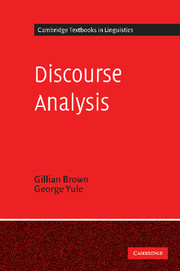Book contents
- Frontmatter
- Contents
- Preface
- Acknowledgements
- Transcription conventions
- 1 Introduction: linguistic forms and functions
- 2 The role of context in interpretation
- 3 Topic and the representation of discourse content
- 4 ‘Staging’ and the representation of discourse structure
- 5 Information structure
- 6 The nature of reference in text and in discourse
- 7 Coherence in the interpretation of discourse
- References
- Subject index
- Author index
3 - Topic and the representation of discourse content
Published online by Cambridge University Press: 05 June 2012
- Frontmatter
- Contents
- Preface
- Acknowledgements
- Transcription conventions
- 1 Introduction: linguistic forms and functions
- 2 The role of context in interpretation
- 3 Topic and the representation of discourse content
- 4 ‘Staging’ and the representation of discourse structure
- 5 Information structure
- 6 The nature of reference in text and in discourse
- 7 Coherence in the interpretation of discourse
- References
- Subject index
- Author index
Summary
In the course of this chapter, we shall examine some of the uses of the term topic in the study of discourse. In the process, we shall explore some recent attempts to construct a theoretical notion of ‘topic’, a notion which seems to be essential to concepts such as ‘relevance’ and ‘coherence’, but which itself is very difficult to pin down. We shall suggest that formal attempts to identify topics are doomed to failure, but that the discourse analyst may usefully make appeal to notions like ‘speaking topically’ and ‘the speaker's topic’ within a ‘topic framework’. We shall also consider briefly how markers of ‘topic-shift’ may be identified in written and spoken discourse. In particular, we shall insist on the principle that it is speakers and writers who have topics, not texts.
We shall then go on to consider how the notion of ‘topic’ relates to representations of discourse content. Since many of the representations proposed are based on a hierarchical organisation of discourse content, we shall consider critically the possibility of characterising ‘topic’ in terms of the top-most elements in the hierarchical representation.
Discourse fragments and the notion ‘topic’
We have already argued that the data used in discourse analysis will inevitably reflect the analyst's particular interests. Moreover, the piece of data chosen for study can only be partially analysed.
- Type
- Chapter
- Information
- Discourse Analysis , pp. 68 - 124Publisher: Cambridge University PressPrint publication year: 1983
- 2
- Cited by



